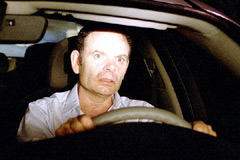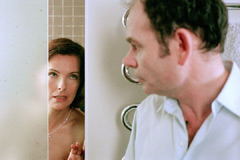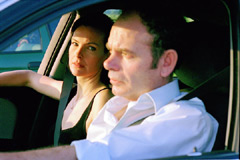Red Lights (Cedric Kahn, 2004)
 Red Lights only further confirms what Iíve previously suspected. Cedric
Kahn is undeniably a world-class talent. Itís obvious after seeing three of
Kahnís films, each of which manages to be a gripping experience despite wildly
different approaches, that the director is far more deserving of the ďMaster
of SuspenseĒ mantle than just about any contemporary director. Constantly
raising the level of tension, almost imperceptibly, is clearly his forte. His
ability to ground his genre exercises in recognizable feelings and everyday
situations only makes them more convincing. Like the nail-biting final act of
Catherine Breillatís Fat Girl extended,
mercilessly, to feature length, Red Lights
uses vehicular stress to exacerbate the effects of the in-car dramas. From the
start of the movie, which takes place entirely on the course of what should be a
routine road tip, thereís so much set-up and mood-building that itís obvious
that the tone will soon grow much tenser. There are shots of the crowded roads,
highway safety warnings issued by the powers that be, and a briefly glimpsed
motorist, stranded on the side of the road next to her smoking car.
Red Lights only further confirms what Iíve previously suspected. Cedric
Kahn is undeniably a world-class talent. Itís obvious after seeing three of
Kahnís films, each of which manages to be a gripping experience despite wildly
different approaches, that the director is far more deserving of the ďMaster
of SuspenseĒ mantle than just about any contemporary director. Constantly
raising the level of tension, almost imperceptibly, is clearly his forte. His
ability to ground his genre exercises in recognizable feelings and everyday
situations only makes them more convincing. Like the nail-biting final act of
Catherine Breillatís Fat Girl extended,
mercilessly, to feature length, Red Lights
uses vehicular stress to exacerbate the effects of the in-car dramas. From the
start of the movie, which takes place entirely on the course of what should be a
routine road tip, thereís so much set-up and mood-building that itís obvious
that the tone will soon grow much tenser. There are shots of the crowded roads,
highway safety warnings issued by the powers that be, and a briefly glimpsed
motorist, stranded on the side of the road next to her smoking car.
 Similarly, from the start first scene we
meet them, thereís considerable unease between the husband and wife. She shows
up late. He has too much to drink. Each rankles the other merely by being
present. When the husband looks at a picture of his wife and children, the
camera beings to pull in, creating a foreboding atmosphere before its presence
is even rational. Some might cringe at such manipulations, but in the suspense
genre, I donít mind being led along if I feel Iím in the hands of a capable
director. The husbandís reckless driving starts a strain of passive aggressive
behavior in the wife, which only further spurns him on. Heís clearly
emasculated when he feels he has to sneak in a drink behind his wifeís back,
so in retaliation, he grows outwardly aggressive toward her. When Kahn
introduces news reports about an escaped fugitive, itís obvious that itís
only a matter of time before he factors into the plot. Red
Lights is predicable in many ways since itís so identifiably a genre film,
and genre films have certain tendencies, but that doesnít make it any less
enjoyable to watch unfold. When the other shoe finally drops and the fugitive
turns up, though, Kahn inserts his trademark humor into the situation, resulting
in unpredictable shifts in tone. The husband is filled with a sense of renewed
independence and thrilled with his regained power to make lousy decisions. He
revels in that state, at least until his imagined kinship with the fugitive
takes on the same dimensions of his one with his wife, and he finds himself
being browbeaten again (this time literally!). He considers the fugitive a
comrade, and fancies himself something of an outlaw, but when he begins to
describe his situation to his newfound friend, the fugitive promptly falls
asleep. Because of Kahnís talent, weíre with the husband every step of the
way, though, always able to understand his actions, even if weíre capable of
analyzing them at an objective distance. The mixture of fear and exhilaration he
feels when passing through a police roadblock isnít logical, but it is
completely understandable, and when he succeeds, the audience feels a bit of
that joy too.
Similarly, from the start first scene we
meet them, thereís considerable unease between the husband and wife. She shows
up late. He has too much to drink. Each rankles the other merely by being
present. When the husband looks at a picture of his wife and children, the
camera beings to pull in, creating a foreboding atmosphere before its presence
is even rational. Some might cringe at such manipulations, but in the suspense
genre, I donít mind being led along if I feel Iím in the hands of a capable
director. The husbandís reckless driving starts a strain of passive aggressive
behavior in the wife, which only further spurns him on. Heís clearly
emasculated when he feels he has to sneak in a drink behind his wifeís back,
so in retaliation, he grows outwardly aggressive toward her. When Kahn
introduces news reports about an escaped fugitive, itís obvious that itís
only a matter of time before he factors into the plot. Red
Lights is predicable in many ways since itís so identifiably a genre film,
and genre films have certain tendencies, but that doesnít make it any less
enjoyable to watch unfold. When the other shoe finally drops and the fugitive
turns up, though, Kahn inserts his trademark humor into the situation, resulting
in unpredictable shifts in tone. The husband is filled with a sense of renewed
independence and thrilled with his regained power to make lousy decisions. He
revels in that state, at least until his imagined kinship with the fugitive
takes on the same dimensions of his one with his wife, and he finds himself
being browbeaten again (this time literally!). He considers the fugitive a
comrade, and fancies himself something of an outlaw, but when he begins to
describe his situation to his newfound friend, the fugitive promptly falls
asleep. Because of Kahnís talent, weíre with the husband every step of the
way, though, always able to understand his actions, even if weíre capable of
analyzing them at an objective distance. The mixture of fear and exhilaration he
feels when passing through a police roadblock isnít logical, but it is
completely understandable, and when he succeeds, the audience feels a bit of
that joy too.
 Throughout Red
Lights, Kahn is clearly in control of our emotions. He utilizes the symmetry
of the highway (cars travel in rows, after all) to full effect, instilling in us
a sense of order that will obviously be corrupted soon. His tight, crisp edits
and mannered compositions function similarly, presenting visual organization so
tidy that dramatic inevitability promises they will soon be upset with mayhem.
The way that Khan introduces that mayhem, however is original enough to catch
you off guard. Thereís a genius scene in which the protagonist places a series
of phone calls. All along, the audience can follow his train of thought. As the
level of tension increases and the sense of danger rises, the shot duration gets
shorter and shorter, until the anxiety is excruciating. Other highlights include
a surprising fade to black followed by an agonizing wait until a crucial plot
event is revealed. Khan teases the audience afterward by shifting to idyllic
shots of the skies and pastures, but itís all in good fun. The third act moves
in radical, surprising directions, finally adding some emotional depth to the
tale while it mines thrills out of the charactersí future. The protagonist
learns the hard way that his bad decisions have consequences, but those mistakes
also pave the way for a redemptive form of justice. Though the ending of Red
Lights arrives with less incident than I had expected, by that time I was
mostly grateful that Khan was releasing his iron grip on my nerves.
Throughout Red
Lights, Kahn is clearly in control of our emotions. He utilizes the symmetry
of the highway (cars travel in rows, after all) to full effect, instilling in us
a sense of order that will obviously be corrupted soon. His tight, crisp edits
and mannered compositions function similarly, presenting visual organization so
tidy that dramatic inevitability promises they will soon be upset with mayhem.
The way that Khan introduces that mayhem, however is original enough to catch
you off guard. Thereís a genius scene in which the protagonist places a series
of phone calls. All along, the audience can follow his train of thought. As the
level of tension increases and the sense of danger rises, the shot duration gets
shorter and shorter, until the anxiety is excruciating. Other highlights include
a surprising fade to black followed by an agonizing wait until a crucial plot
event is revealed. Khan teases the audience afterward by shifting to idyllic
shots of the skies and pastures, but itís all in good fun. The third act moves
in radical, surprising directions, finally adding some emotional depth to the
tale while it mines thrills out of the charactersí future. The protagonist
learns the hard way that his bad decisions have consequences, but those mistakes
also pave the way for a redemptive form of justice. Though the ending of Red
Lights arrives with less incident than I had expected, by that time I was
mostly grateful that Khan was releasing his iron grip on my nerves.
69
Jeremy Heilman
06-10-04